
By Niketas Chonates from O City of Byzantium
ONCE Doukas had clearly won the throne by a cast of the die, he longed painfully for changes in the affairs of the state and thought to stir up everything. He was extremely clever by nature and arrogant in his manner, and he believed dissembling to be the mark of shrewdness. He shirked the role of benefactor in all things for as long as the cycle of Meton, saying that he did not deem it prudent in an emperor to allow things to happen on their own and in a haphazard fashion, but that his actions should be characterized by protracted circumspection. He was impelled toward such judgment of his own accord, contending that nothing that needed to be done escaped him, that he had well in hand all issues. Following him about as his assistant was the feeble shadow of his father-in-law Philokales, and in order to place him at the head of the senate, he dismissed me as logothete of the sekreta, without even the benefit of a specious excuse, and promoted him in my place. This man, wholly unprepared to make himself known and precariously exceeding propriety because of inordinate ambition, did not sit together with men of high rank. Some he fooled by affecting the gout, as if his brain had flowed down into his feet with the disease, and so, with his wits wandering, he neglected his duties.
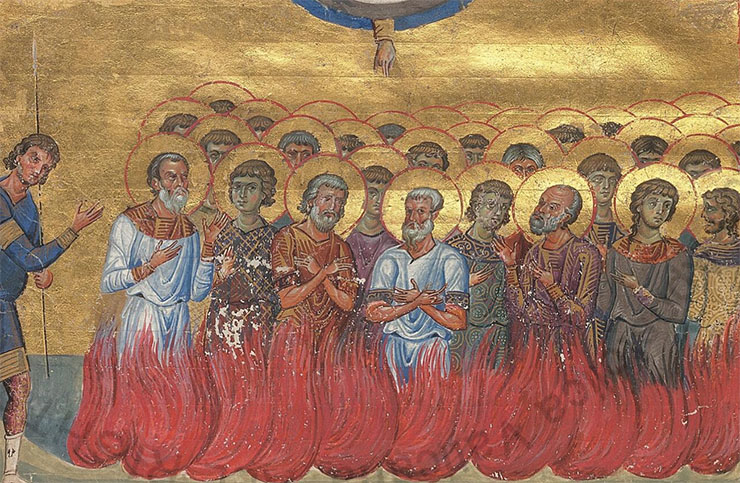
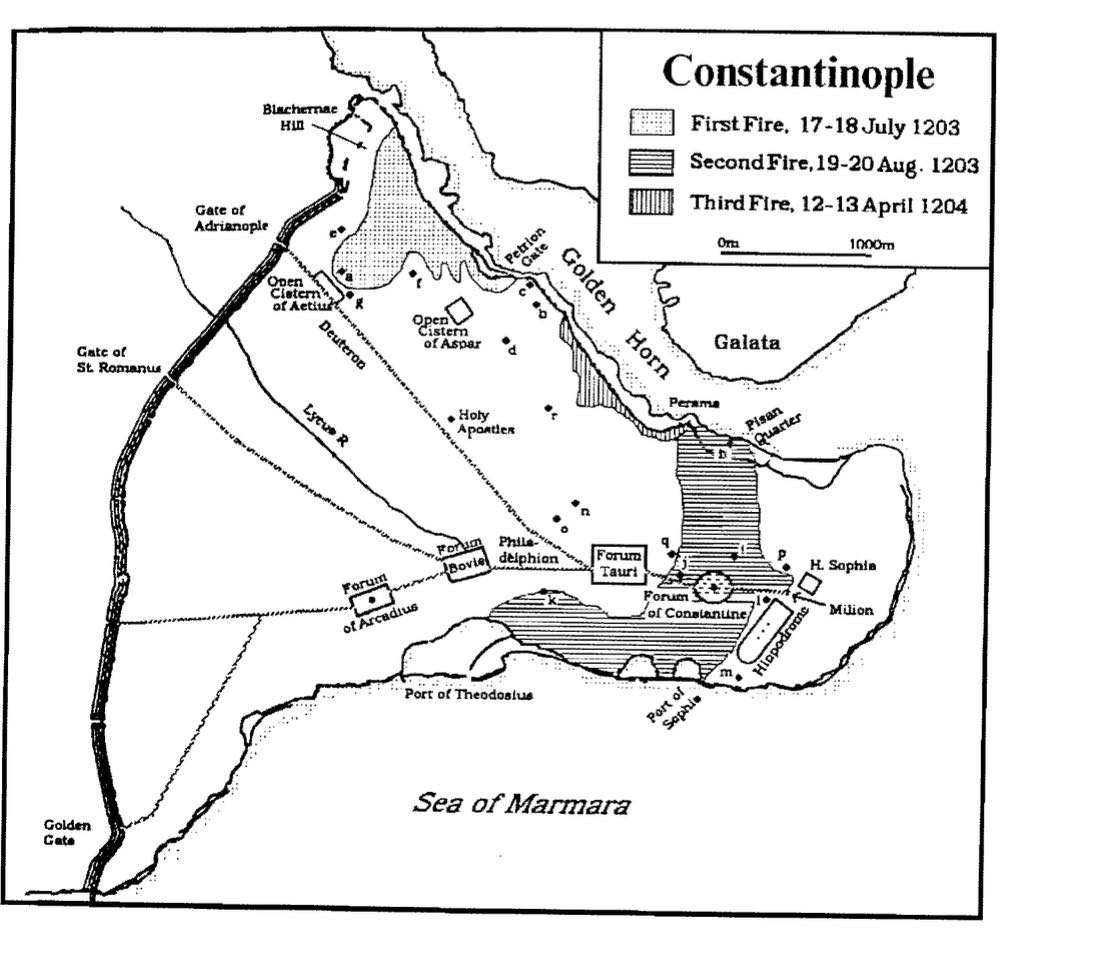 Because the emperor Doukas found the imperial treasury neither full nor half-full, but completely emptied out, he reaped where he sowed not and gathered where he had not strawed, grievously afflicting those who were formerly girded with the highest offices under the Angelos family, who were elevated as sebastokrators and kaisars to exalted dignities, and their confiscated monies he applied to public needs.
Because the emperor Doukas found the imperial treasury neither full nor half-full, but completely emptied out, he reaped where he sowed not and gathered where he had not strawed, grievously afflicting those who were formerly girded with the highest offices under the Angelos family, who were elevated as sebastokrators and kaisars to exalted dignities, and their confiscated monies he applied to public needs.
 In rashly resisting the Latins, he surpassed all others; he shored up the City's sea walls with beams, provided the land walls with fortifications, and rekindled the army's courage with his own example. Moreover, clasping sword in. hand and armed with a bronze mace, he would beat back the enemy's sallies, and when they made sporadic sorties in search of provisions, he would appear suddenly before them of his own free will.
In rashly resisting the Latins, he surpassed all others; he shored up the City's sea walls with beams, provided the land walls with fortifications, and rekindled the army's courage with his own example. Moreover, clasping sword in. hand and armed with a bronze mace, he would beat back the enemy's sallies, and when they made sporadic sorties in search of provisions, he would appear suddenly before them of his own free will.
Such deeds endeared him to the citizens, although he was extremely distrustful of, and uncompromising towards, his blood relations; nurtured in stupidity and reared in softness, spurning uplifting austerity and prudent behavior even as sick bodies avoid medical treatment, they exalted themselves and were hardened. They turned away from Doukas's rebuke and indignation (for he had by nature a hoarse but resounding bass voice) as they would from the taste of raw octopus, or a meal of hellebore, or a drink of bull's blood, and they deemed his destruction a matter of divine retribution.
Phileas and collected tribute thence, the emperor marched against him. As the Romans were moving out and the enemy troops returning from their battle array, they met in close combat. The Romans were paralyzed by fear and took to impetuous flight; the emperor, left all alone, very nearly perished, and the icon of the Mother of God, which the Roman
Lemperors reckon as their fellow general, was taken by the enemy. Not only were these events dreadful, but those that followed were much worse than expected and most calamitous. In the larger ships frightful scaling ladders were once again fabricated and all manner of siege engines were constructed. Banners were flown on top, and huge rewards were offered those who would ascend to give battle.
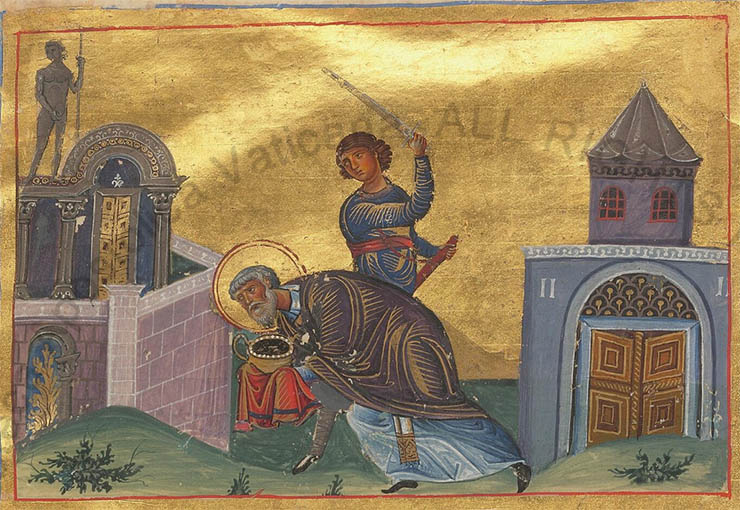 A measure of the horrors was about to begin, others were already under way, and still others were to follow; the deliberations on amity were disregarded, wholly ignored. Certain wicked Telchines frequently confounded the negotiations. The doge of Venice, Enrico Dandolo, electing to discuss peace terms with the emperor, boarded a trireme and put in at Kosmidion. As soon as the emperor arrived there on horseback, they exchanged views on the peace, paying no heed to anyone else. The demands made by the doge and the remaining chiefs were for the immediate payment of five thousand pounds of gold and certain other conditions which were both galling and unacceptable to those who have tasted freedom and are accustomed to give, not take, commands. These demands were deemed to be heavy Laconian lashes to those for whom the danger of captivity was imminent and universal destruction had erupted, while the doge loudly again declared what had been stated earlier, that the conditions were quite tolerable and not at all burdensome. As the conditions for peace were being negotiated, Latin cavalry forces, suddenly appearing from above, gave free rein to their horses and charged the emperor, who wheeled his horse around, barely escaping the danger, while some of his companions were taken captive. Their inordinate hatred for us and our excessive disagreement with them allowed for no humane feeling between us.
A measure of the horrors was about to begin, others were already under way, and still others were to follow; the deliberations on amity were disregarded, wholly ignored. Certain wicked Telchines frequently confounded the negotiations. The doge of Venice, Enrico Dandolo, electing to discuss peace terms with the emperor, boarded a trireme and put in at Kosmidion. As soon as the emperor arrived there on horseback, they exchanged views on the peace, paying no heed to anyone else. The demands made by the doge and the remaining chiefs were for the immediate payment of five thousand pounds of gold and certain other conditions which were both galling and unacceptable to those who have tasted freedom and are accustomed to give, not take, commands. These demands were deemed to be heavy Laconian lashes to those for whom the danger of captivity was imminent and universal destruction had erupted, while the doge loudly again declared what had been stated earlier, that the conditions were quite tolerable and not at all burdensome. As the conditions for peace were being negotiated, Latin cavalry forces, suddenly appearing from above, gave free rein to their horses and charged the emperor, who wheeled his horse around, barely escaping the danger, while some of his companions were taken captive. Their inordinate hatred for us and our excessive disagreement with them allowed for no humane feeling between us.
Thereupon [8 April 1204], the enemy's largest ships, carrying the scaling ladders that had been readied and as many of the siege engines as had been prepared, moved out from the shore, and, like the tilting beam of a scale's balance, they sailed over to the walls to take up positions at sufficient intervals from one another. They occupied the region extending in a line from the Monastery of Evergetes to the palace in Blachernai, which had been set on fire, the buildings within razed to the ground, thus stripping it of every pleasant spectacle. Observing these maneuvers, Doukas prepared to resist the enemy. He issued instructions for the imperial pavilion to be set up on the hill of the Pentapoptes monastery whence the warships were visible and the actions of those on board were in full view.
As dawn broke on the ninth day of the month of April in the seventh indiction of the year 6712 [9 April 1204], the warships and dromons approached the walls, and certain courageous warriors climbed the scaling ladders and discharged all manner of missiles against the towers' defenders. All through the day, a battle fraught with groanings was waged. The Romans had the upper hand: both the ships carrying the scaling ladders and the dromons transporting the horses were repulsed from the walls they had attacked without success, and many were killed by the stones thrown from the City's engines.
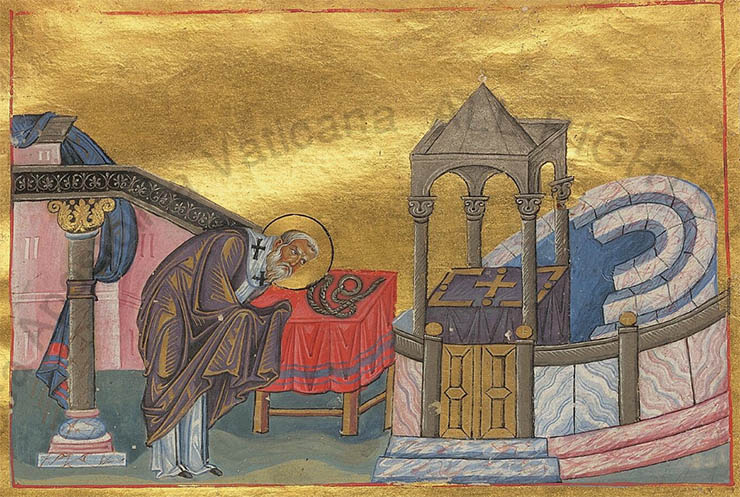 The enemy ceased all hostilities through the next day and the day after, which was the Lord's day [Sunday, 10-11 April 1204]; on the third day, the twelfth day of the month of April, Monday of the sixth week of the Great Lent, they again sailed towards the City and put in along the shore. By midday our forces prevailed, even though the fighting was more intense and furious than on the preceding Friday. Since it was necessary for the queen of cities to put on the slave's yoke, God allowed our jaws to be constrained with bit and curb1507 because all of us, both priest and people, had turned away from him like a stiff-necked and unbridled horse. Two men on one of the scaling ladders nearest the Petria Gate, which was raised with great difficulty opposite the emperor, trusting themselves to fortune, were the first from among their comrades to leap down onto the tower facing them. When they drove off in alarm the Roman auxiliaries on watch, they waved their hands from above as a sign of joy and courage to embolden their countrymen. While they were jumping onto the tower, a knight by the name of Peter entered through the gate situated there. He was deemed most capable of driving in rout all the battalions,"" for he was nearly nine fathoms tall and wore on his head a helmet fashioned in the shape of a towered city. The noblemen about the emperor and the rest of the troops were unable to gaze upon the front of the helm's" of a single knight so terrible in form and spectacular in size and took to their customary flight as the efficacious medi- cine of salvation. Thus, by uniting and fusing into one craven soul, the cowardly thousands, who had the advantage of a high hill, were chased by one man from the fortifications they were meant to defend. When they reached the Golden Gate of the Land walls, they pulled down the new-built wall there, ran forth, and dispersed, deservedly taking the road to perdition and utter destruction. The enemy, now that there was no one to raise a hand against them, ran everywhere and drew the sword against every age and sex. Each did not join with the next man to form a coherent battle array, but all poured out and scattered, since everyone was terrified of them.
The enemy ceased all hostilities through the next day and the day after, which was the Lord's day [Sunday, 10-11 April 1204]; on the third day, the twelfth day of the month of April, Monday of the sixth week of the Great Lent, they again sailed towards the City and put in along the shore. By midday our forces prevailed, even though the fighting was more intense and furious than on the preceding Friday. Since it was necessary for the queen of cities to put on the slave's yoke, God allowed our jaws to be constrained with bit and curb1507 because all of us, both priest and people, had turned away from him like a stiff-necked and unbridled horse. Two men on one of the scaling ladders nearest the Petria Gate, which was raised with great difficulty opposite the emperor, trusting themselves to fortune, were the first from among their comrades to leap down onto the tower facing them. When they drove off in alarm the Roman auxiliaries on watch, they waved their hands from above as a sign of joy and courage to embolden their countrymen. While they were jumping onto the tower, a knight by the name of Peter entered through the gate situated there. He was deemed most capable of driving in rout all the battalions,"" for he was nearly nine fathoms tall and wore on his head a helmet fashioned in the shape of a towered city. The noblemen about the emperor and the rest of the troops were unable to gaze upon the front of the helm's" of a single knight so terrible in form and spectacular in size and took to their customary flight as the efficacious medi- cine of salvation. Thus, by uniting and fusing into one craven soul, the cowardly thousands, who had the advantage of a high hill, were chased by one man from the fortifications they were meant to defend. When they reached the Golden Gate of the Land walls, they pulled down the new-built wall there, ran forth, and dispersed, deservedly taking the road to perdition and utter destruction. The enemy, now that there was no one to raise a hand against them, ran everywhere and drew the sword against every age and sex. Each did not join with the next man to form a coherent battle array, but all poured out and scattered, since everyone was terrified of them.
That evening the enemy set fire to the eastern sections of the City not far from the Monastery of Evergetes; from there the flames spread to those areas that slope down to the sea and terminate in the vicinity of the Droungarios Gate. After despoiling the emperor's pavilion and taking the palace in Blachernai by assault without difficulty, they set up their gen- eral headquarters at the Pantepoptes monastery. The emperor went hither and yon through the City's narrow streets, attempting to rally and mobilize the populace who wandered aimlessly about. Neither were they convinced by his exhortations nor did they yield to his blandishments, but the fiercely shaken aegis filled all with despair.
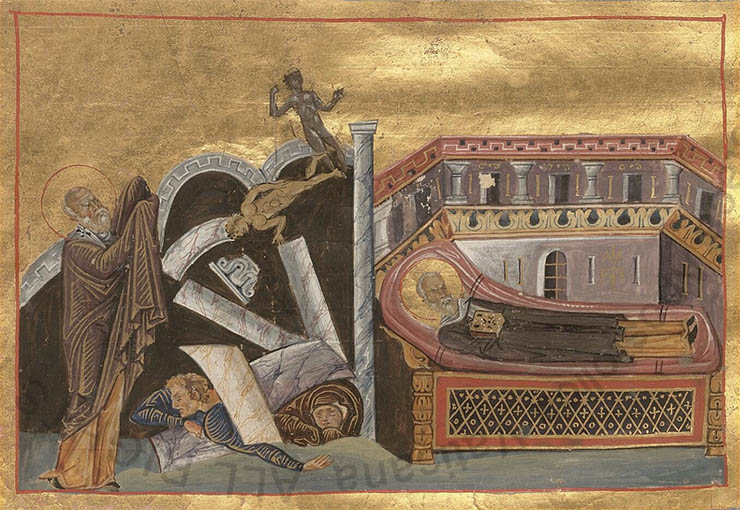 To continue with the remaining portions of my narrative, the day waned and night came on, and each and every citizen busied himself with removing and burying his possessions. Some chose to leave the City, and whoever was able hastened to save himself. When Doukas saw that he could prevail nothing, he was fearful lest he be apprehended and put into the jaws of the Latins as their dinner or dessert, and he entered the Great Palace. He put on board a small fishing boat the Empress Euphrosyne, Emperor Alexios's wife, and her daughters, one of whom he loved passionately [Evdokia] (for he had frequently engaged in sexual intercourse from the first appearance of hair on his cheek, and he was a proven lecher in bed, having put away two wedded wives) and sailed away from the City [night of 12- 13 April 1204], having reigned two months and sixteen days.
To continue with the remaining portions of my narrative, the day waned and night came on, and each and every citizen busied himself with removing and burying his possessions. Some chose to leave the City, and whoever was able hastened to save himself. When Doukas saw that he could prevail nothing, he was fearful lest he be apprehended and put into the jaws of the Latins as their dinner or dessert, and he entered the Great Palace. He put on board a small fishing boat the Empress Euphrosyne, Emperor Alexios's wife, and her daughters, one of whom he loved passionately [Evdokia] (for he had frequently engaged in sexual intercourse from the first appearance of hair on his cheek, and he was a proven lecher in bed, having put away two wedded wives) and sailed away from the City [night of 12- 13 April 1204], having reigned two months and sixteen days.
When the emperor had fled in this manner, a pair of youths sober and most skillful in matters of warfare, these being Doukas and Laskaris, bearing the same name as the first emperor of our faith [Constantine], contested the captaincy of a tempest-tossed ship, for they viewed the great and celebrated Roman empire as Fortune's prize, de- pending upon the chance move of a chessman. They entered the Great Church, evenly matched, competing against each other and being compared one with the other, neither one having more or less to offer than the other, and they were deemed equal in the balance because there was no one to examine them and pass judgment.
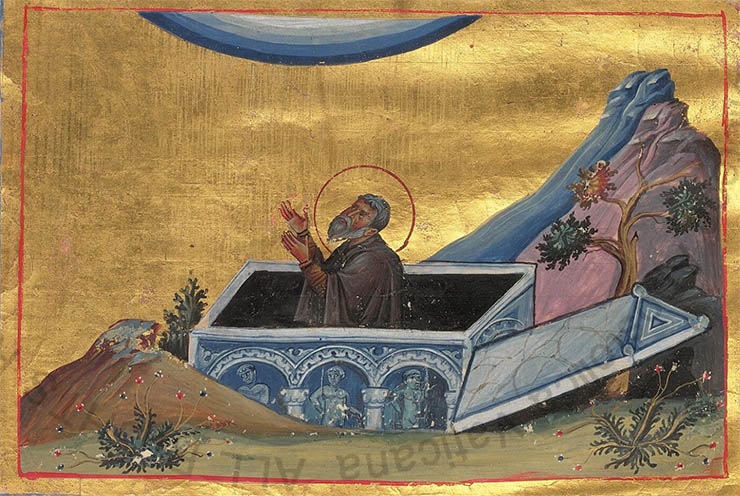 Receiving the supreme office by lot, Laskaris refused the imperial insignia; escorted by the patriarch to the Milion, he continuously exhorted the assembled populace, cajoling them to put up a resistance. He pressed those who lift from the shoulder and brandish the deadly iron ax, sending them off to the imminent struggle, reminding them that they should not fear destruction any less than the Romans should the Roman empire fall to another nation: no longer would they be paid the ample wages of mercenaries or receive the far-famed gifts of honor of the imperial guard, and their pay in the future would be counted at a hair's worth. Thus did Laskaris, but not a single person from the populace responded to his blandishments. The ax-bearers agreed to fight for wages, deceitfully and cunningly exploiting the height of the danger for monetary gain, and when the Latin battalions clad in full armor made their appearance, they took flight to save themselves [early morning of 13 April 1204].
Receiving the supreme office by lot, Laskaris refused the imperial insignia; escorted by the patriarch to the Milion, he continuously exhorted the assembled populace, cajoling them to put up a resistance. He pressed those who lift from the shoulder and brandish the deadly iron ax, sending them off to the imminent struggle, reminding them that they should not fear destruction any less than the Romans should the Roman empire fall to another nation: no longer would they be paid the ample wages of mercenaries or receive the far-famed gifts of honor of the imperial guard, and their pay in the future would be counted at a hair's worth. Thus did Laskaris, but not a single person from the populace responded to his blandishments. The ax-bearers agreed to fight for wages, deceitfully and cunningly exploiting the height of the danger for monetary gain, and when the Latin battalions clad in full armor made their appearance, they took flight to save themselves [early morning of 13 April 1204].
The enemy, who had expected otherwise, found no one openly venturing into battle or taking up arms to resist; they saw that the way was open before them and everything there for the taking. The narrow streets were clear and the crossroads unobstructed, safe from attack, and advantageous to the enemy. The populace, moved by the hope of propitiating them, had turned out to greet them with crosses and venerable icons of Christ as was customary during festivals of solemn processions. But their disposition was not at all affected by what they saw, nor did their lips break into the slightest smile, nor did the unexpected spectacle transform their grim and frenzied glance and fury into a semblance of cheerfulness. Instead, they plundered with impunity and stripped their victims shamelessly, beginning with their carts. Not only did they rob them of their substance but also the articles consecrated to God; the rest fortified themselves all around with defensive weapons as their horses were roused at the sound of the war trumpet.
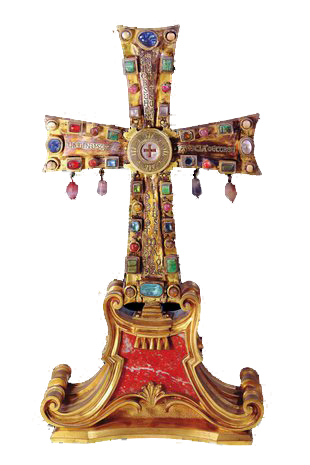 What then should I recount first and what last of those things dared at that time by these murderous men? 0, the shameful dashing to earth of the venerable icons and the flinging of the relics of the saints, who had suffered for Christ's sake, into defiled places! How horrible it was to see the Divine Body and Blood of Christ poured out and thrown to the ground! These forerunners of Antichrist, chief agents and harbingers of his anticipated ungodly deeds, seized as plunder the precious chalices and patens; some they smashed, taking possession of the ornaments embellishing them, and they set the remaining vessels on their tables to serve as bread dishes and wine goblets. Just as happened long ago, Christ was now disrobed and mocked, his garments were parted, and lots were cast for them by this race; and although his side was not pierced by the lance, yet once more streams of Divine Blood poured to the earth.
What then should I recount first and what last of those things dared at that time by these murderous men? 0, the shameful dashing to earth of the venerable icons and the flinging of the relics of the saints, who had suffered for Christ's sake, into defiled places! How horrible it was to see the Divine Body and Blood of Christ poured out and thrown to the ground! These forerunners of Antichrist, chief agents and harbingers of his anticipated ungodly deeds, seized as plunder the precious chalices and patens; some they smashed, taking possession of the ornaments embellishing them, and they set the remaining vessels on their tables to serve as bread dishes and wine goblets. Just as happened long ago, Christ was now disrobed and mocked, his garments were parted, and lots were cast for them by this race; and although his side was not pierced by the lance, yet once more streams of Divine Blood poured to the earth.
The report of the impious acts perpetrated in the Great Church are unwelcome to the ears. The table of sacrifice, fashioned from every kind of precious material and fused by fire into one whole-blended together into a perfection of one multicolored thing of beauty, truly extraordinary and admired by all nations-was broken into pieces and divided among the despoilers, as was the lot of all the sacred church treasures, countless in number and unsurpassed in beauty. They found it fitting to bring out as so much booty the all-hallowed vessels and furnishings which had been wrought with incomparable elegance and craftsmanship from rare materials. In addition, in order to remove the pure silver which overlay the railing of the bema, the wondrous pulpit and the gates, as well as that which covered a great many other adornments, all of which were plated with gold, they led to the very sanctuary of the temple itself mules and asses with packsaddles; some of these, unable to keep their feet on the smoothly polished marble floors, slipped and were pierced by knives so that the excrement from the bowels and the spilled blood defiled the sacred floor. Moreover, a certain silly woman laden with sins, an attendant of the Erinyes, the handmaid of demons, the workshop of unspeakable spells and reprehensible charms, waxing wanton against Christ,'... sat upon the synthronon and intoned a song, and then whirled about and kicked up her heels in dance.
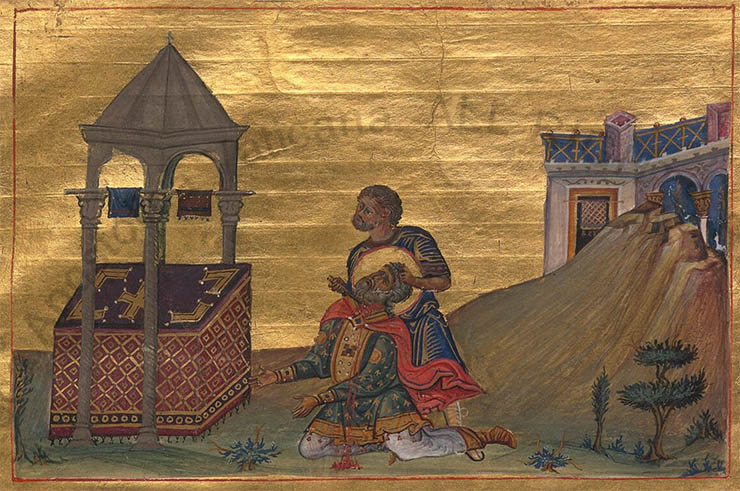 It was not that these crimes were committed in this fashion while others were not, or that some acts were more heinous than others, but that the most wicked and impious deeds were perpetrated by all with one accord. Did these madmen, raging thus against the sacred, spare pious matrons and girls of marriageable age or those maidens who, having chosen a life of chastity, were consecrated to God? Above all, it was a difficult and arduous task to mollify the barbarians with entreaties and to dispose them kindly towards us, as they were highly irascible and bilious and unwilling to listen to anything. Everything incited their anger, and they were thought fools and became a laughingstock. He who spoke freely and openly was rebuked, and often the dagger would be drawn against him who expressed a small difference of opinion or who hesitated to carry out their wishes.
It was not that these crimes were committed in this fashion while others were not, or that some acts were more heinous than others, but that the most wicked and impious deeds were perpetrated by all with one accord. Did these madmen, raging thus against the sacred, spare pious matrons and girls of marriageable age or those maidens who, having chosen a life of chastity, were consecrated to God? Above all, it was a difficult and arduous task to mollify the barbarians with entreaties and to dispose them kindly towards us, as they were highly irascible and bilious and unwilling to listen to anything. Everything incited their anger, and they were thought fools and became a laughingstock. He who spoke freely and openly was rebuked, and often the dagger would be drawn against him who expressed a small difference of opinion or who hesitated to carry out their wishes.
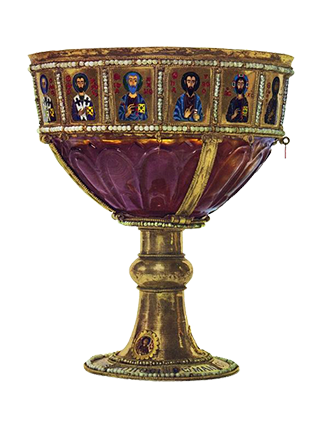 The whole head was in pain. There were lamentations and cries of woe and weeping in the narrow ways, wailing at the crossroads, moaning in the temples, outcries of men, screams of women, the taking of captives, and the dragging about, tearing in pieces, and raping of bodies heretofore sound and whole. They who were bashful of their sex were led about naked, they who were venerable in their old age uttered plaintive cries, and the wealthy were despoiled of their riches. Thus it was in the squares, thus it was on the corners, thus it was in the temples, thus it was in the hiding places; for there was no place that could escape detection or that could offer asylum to those who came streaming in.
The whole head was in pain. There were lamentations and cries of woe and weeping in the narrow ways, wailing at the crossroads, moaning in the temples, outcries of men, screams of women, the taking of captives, and the dragging about, tearing in pieces, and raping of bodies heretofore sound and whole. They who were bashful of their sex were led about naked, they who were venerable in their old age uttered plaintive cries, and the wealthy were despoiled of their riches. Thus it was in the squares, thus it was on the corners, thus it was in the temples, thus it was in the hiding places; for there was no place that could escape detection or that could offer asylum to those who came streaming in.
0 Christ our Emperor, what tribulation and distress of men at that time! The roaring of the sea, the darkening and dimming of the sun, the turning of the moon into blood, the displacement of the stars-did they not foretell in this way the last evils? Indeed, we have seen the abomination of desolation stand in the holy place, rounding off meretricious and petty speeches and other things which were moving definitely, if not altogether, contrariwise to those things deemed by Christians as holy and ennobling the word of faith.
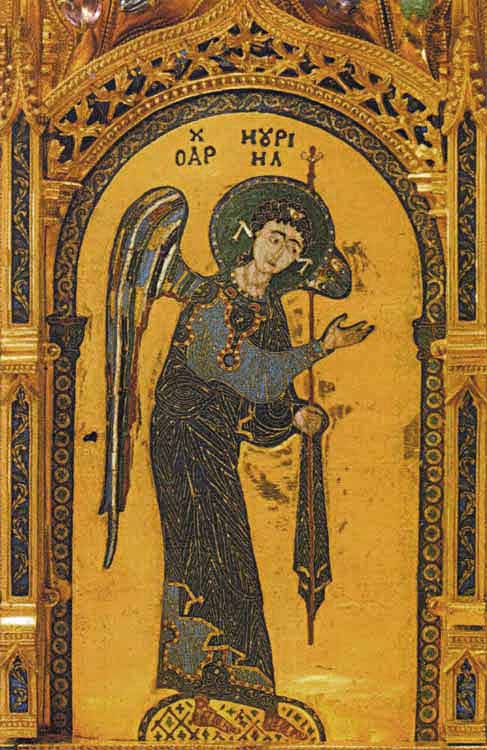 Such then, to make a long story short, were the outrageous crimes committed by the Western armies against the inheritance of Christ. Without showing any feelings of humanity whatsoever, they exacted from all their money and chattel, dwellings and clothing, leaving to them nothing of all their goods. Thus behaved the brazen neck, the haughty spirit, the high brow, the ever-shaved and youthful cheek, the bloodthirsty right hand, the wrathful nostril, the disdainful eye, the insatiable jaw, the hateful heart, the piercing and running speech practically dancing over the lips. More to blame were the learned and wise among men, they who were faithful to their oaths, who loved the truth and hated evil, who were both more pious and just and scrupulous in keeping the commandments of Christ than we "Greeks.""" Even more culpable were those who had raised the cross to their shoulders, who had time and again sworn by it and the sayings of the Lord to cross over Christian lands without bloodletting, neither turning aside to the right nor inclining to the left, and to take up arms against the Saracens and to stain red their swords in their blood; they who had sacked Jerusalem, and had taken an oath not to marry or to have sexual intercourse with women as long as they carried the cross on their shoulders, and who were consecrated to God and commissioned to follow in his footsteps.
Such then, to make a long story short, were the outrageous crimes committed by the Western armies against the inheritance of Christ. Without showing any feelings of humanity whatsoever, they exacted from all their money and chattel, dwellings and clothing, leaving to them nothing of all their goods. Thus behaved the brazen neck, the haughty spirit, the high brow, the ever-shaved and youthful cheek, the bloodthirsty right hand, the wrathful nostril, the disdainful eye, the insatiable jaw, the hateful heart, the piercing and running speech practically dancing over the lips. More to blame were the learned and wise among men, they who were faithful to their oaths, who loved the truth and hated evil, who were both more pious and just and scrupulous in keeping the commandments of Christ than we "Greeks.""" Even more culpable were those who had raised the cross to their shoulders, who had time and again sworn by it and the sayings of the Lord to cross over Christian lands without bloodletting, neither turning aside to the right nor inclining to the left, and to take up arms against the Saracens and to stain red their swords in their blood; they who had sacked Jerusalem, and had taken an oath not to marry or to have sexual intercourse with women as long as they carried the cross on their shoulders, and who were consecrated to God and commissioned to follow in his footsteps.
In truth, they were exposed as frauds. Seeking to avenge the Holy Sepulcher, they raged openly against Christ and sinned by overturning the Cross with the cross they bore on their backs, not even shuddering to trample on it for the sake of a little gold and silver. By grasping pearls, they rejected Christ, the pearl of great price, scattering among the most accursed of brutes the All-Hallowed One.'s2s The sons of Ismael did not behave in this way, for when the Latins overpowered Sion the Latins showed no compassion or kindness to their race. Neither did the Ismaelites neigh after Latin women, nor did they turn the cenotaph of Christ into a common burial place of the fallen, nor did they transform the entranceway of the life-bringing tomb into a passageway leading down into Hades, nor did they replace the Resurrection with the Fall. Rather, they allowed everyone to depart in exchange for the payment of a few gold coins; they took only the ransom money and left to the people all their possessions, even though these numbered more than the grains of sand. Thus the enemies of Christ dealt magnanimously with the Latin infidels, inflicting upon them neither sword, nor fire, nor hunger, nor persecution, nor nakedness, nor bruises, nor constraints. How differently, as we have briefly recounted, the Latins treated us who love Christ and are their fellow believers, guiltless of any wrong against them.
O City, City, eye of all cities, universal boast, supramundane wonder, wet nurse of churches, leader of the faith, guide of Orthodoxy, beloved topic of orations, the abode of every good thing! 0 City, that hast drunk at the hand of the Lord the cup of his fury! 0 City, consumed by a fire far more drastic than the fire which of old fell upon the Pentapolis! "What shall I testify to thee? What shall I compare to thee? The cup of thy destruction is magnified," says Jeremias, who was given to tears as he lamented over ancient Sion.'533 What malevolent powers have desired to have you and taken you to be sifted?' What jealous and relentless avenging demons have made a riotous assault upon you in wild revel? If these implacable and crazed suitors neither fashioned a bridal chamber for thee, nor lit a nuptial torch for thee, did they not, however, ignite the coals of destruction?
O prolific City, once garbed in royal silk and purple and now filthy and squalid and heir to many evils, having need of true children! 0 City, formerly enthroned on high, striding far and wide, magnificent in comeliness and more becoming in stature now thy luxurious garments and elegant royal veils are rent and torn; thy flashing eye has grown dark, and thou art like unto an aged furnace woman all covered with soot, and thy formerly glistening and delightful countenance is now furrowed by loose wrinkles. I shall forego describing those who set words to the music of the lyre and sang of thy calamities and, drunk with wine, turned thy tragedy into a comedy, making a profession out of the farcical recitation of thine afflictions: blows struck with the fist and the foot, bruises, moreover, and black eyes inflicted upon thee every hour of the day; for by God's will thou hast provoked to jealousy the foolish nations, or rather, those people who are not truly nations but obscure and scattered tribes, and if thou didst not give birth to the majority of them, thou didst, however, raise them up and provide them with the fat of wheat.
"Who shall save thee? Or who shall comfort thee?' Or who shall turn back to inquire after thy welfare? Thus spake the much-wailing Jeremias. Who shall dress in thy former raiment? When shall thou hear those divinely inspired words: "Awake, awake, stand up, 0 City, that hast drunk the cup of my fury and the cup of calamity." Put on thy strength, put on thy glory."" Shake off the dust and arise. Put off the band of thy neck. Enlarge the place of thy tent, and of thy curtains."" Fear not because thou hast been put to shame, neither be confounded because thou wast reproached, and all that go by the way have clapped their hands at thee; they have hissed and shaken their heads and have said, "This is the city, the crown of glory and of joy of all the earth," and, "How does the city that was filled with people sit as a widow, and how has she, princess among provinces, become tributary? For thy God has said, "For a little while I left thee, but with great mercy will I have compassion upon thee. In a little wrath I turned away my face, but with everlasting mercy will I have compassion upon thee.s Perhaps, thou shalt sing out to God with David, "0 Lord, according to the multitude of my griefs within my heart, thy consolations have gladdened my soul."
Who shall be set over thee as another Moses to renew all things, or who shall restore thee as another Zorobabel? When shall the time come for thee to gather thy children from the four winds to which we have scattered, even as hens which love their chicks gather them under their wings. And now we cannot freely gaze upon thee, face to face, nor joyously cling to thee as to a mother and openly pour out for thee a libation of tears as many as the eyes wish or can, but flying cautiously around thee like sparrows whose mother and source of nourishment has been taken captive and whose nest has been scattered to the winds, we emit piteous and mournful cries; expelled far from thy nesting places, hungry and thirsty, shivering in squalor, often close shorn because of lice, our souls wasting away because of our afflictions, we are no longer able to find the way back to our homes in the City, but roam far and wide like fickle. migratory birds and the planets. In other words, although we are apart, we are united to thee, and being separated, we are intertwined like those who are joined together in spirit even though removed in body, and suffer, moreover, the same anguish as experienced by some animals when beholding their own kind ensnared by hunters and confined within a glass cage. Those animals, gazing upon the sight of their fellow beast, visible in the clarity and brightness of the vessel, are wholly unable to come into physical contact with it. For this reason they vainly circle the receptacle in dismay, bewildered by the captive beast's countenance so dramatically altered from its former appearance. And we likewise wish to cast our eyes upon thee and to draw near, for we have been altogether deprived of clasping thee wholeheartedly to our breast and of boldly embracing thee as in former times, kept asunder by the barbarian forces as though by a solid body much more impervious than glass.
"Why hast thou smitten us, Lord, and there is no healing for us?" We know, 0 Lord, our sins, and the iniquities of our fathers. Refrain out of mercy, destroy not the throne of thy glory.'554 Chasten us, 0 Lord, that our soul may not be removed from thee, but with judgment and not in wrath, lest thou make us few. Pour out thy wrath upon the families that have not called upon thy name. Lord, thou art our Father; we are clay, and thou our potter, and we are all the work of thine hands. Behold, and look on our reproaches. Our inheritance has been turned away to aliens, our houses to strangers." Turn us, 0 Lord, to thee, and we shall be turned. Most useful and timely are these scriptural verses in describing similar calamities.
But now even my power of speech fails me, like a body which, united to the soul as her attendant, succumbs and dies together with thee, 0 nurturer of the word! One ought to dedicate to thee copious lamentations with muted tears and stifled groaning and refrain from continuing the sequence
of this history. For in a land long alienated from letters and completely barbarized, who dares sing out the Muses' melodies? Nor should I be singing out the accomplishments of the barbarians, nor passing on to posterity military actions in which Hellenes were not victorious. For if Hippocrates of Kos, who was promised huge sums of money by the king of the Persians to visit the cities under his rule in order to tend to those who were sorely afflicted with disease, absolutely refused. to give ear to the summons and allowed the barbarians to go to ruin ' how then can I devote the very best thing and the most beautiful invention of the Hellenes - history - to the recounting of barbarian deeds against Hellenes?
But let these, like the incendiary of the temple of Artemis in Ephesos, be gone out of sight and out of hearing, not even meriting a greeting from us until the iniquity has passed away and God be entreated concerning his servants. For it cannot be that our God shall forget forever, nor shall he in anger shut up his tender mercies and be well pleased no more, but he both wounds and heals, kills and restores to life. If he does send the teeth of wild beasts with the rage of serpents creeping on the ground he also breaks the jaw teeth of the lions and crushes the dragon's head. If he breaks the reed, he also rebukes the wild beasts of the reed. If some glory lies in chariots and some in horses, yet a horse is vain for safety, and neither is he well pleased with the legs of a man. If he shows his own people hard things and gives them to drink the wine of astonishment, he also prepares a table in the presence of them that afflict us and offers the cup of gladness which brings cheer like the best wine. If he gathers the scourgers from the ends of the earth and from them that are on the sea afar off, and cries out through the great preacher and prophet, "Giants are coming to fulfill my wrath, rejoicing at the same time and dancing; for they are blessed and I bring them, he inflicts upon them even more violent blows and flogs the worst among them with afflictions, showing no partiality whatsoever. He either uses these as instruments for the ruin of cities and to effect public calamities and as pitiless executioners of men, or, as the physician of souls, he uses the majority of them in nursing the sick and as healing remedies whose nature is evident to the wise. The nurses either perished with the patient, or, once the sick recovered, they withered away for lack of something to do; and the curative medications that healed the infirmity were excreted together.
I affirm that what is needed is not a writing of divorcement given us by God, nor should we consider the ensuing horrors a grafting of the barbarians as a wild olive tree into our good olive tree. What is needed is a small chastening which God knows how to lay on, in which excess is foregone and all things are not permitted to the tempters, but those who are sorely tried are spared. Indeed, if in their actions they [the Latins] did not know the limits of wickedness and were impiously arrogant towards him from Whom they received the power to flog, like Nabouzardan, the captain of the guard, they consigned the city of God to the flames and carried away the liturgical vessels as booty, and like Baltasar who reveled in these vessels, profaned the altars and mocked the Holy Mysteries; the suffering [Roman] on the other hand, accusing himself at the beginning of his defense, fervently called upon God to be his comforter.
In expectation of God's love for mankind, we ought to sing out with David, "Remember us, 0 Lord, with the favor thou hast to thy people; visit us with thy salvation that we may behold the good of thine elect, that we may rejoice in the gladness of thy nation, that we may glory knowing full well that in the end the ungodly shall be overlooked and flogged, and that for those who hope in the Lord their chastisement shall be accompanied by the call to repentance and consolation.
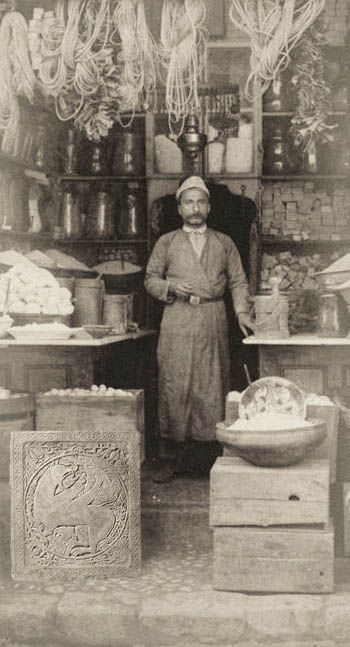 Shops operated from columned porticos. Merchandise was offered on the street and within the store. Most shops were family operated.
Shops operated from columned porticos. Merchandise was offered on the street and within the store. Most shops were family operated.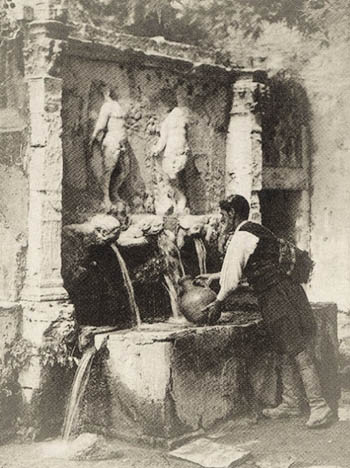 Constantinople was served by aqueducts to fountains and open air cisterns around the city. Fountains would have been decorated with ancient statues and sculpture like this. People drew much of their water from wells that accessed underground cisterns.
Constantinople was served by aqueducts to fountains and open air cisterns around the city. Fountains would have been decorated with ancient statues and sculpture like this. People drew much of their water from wells that accessed underground cisterns.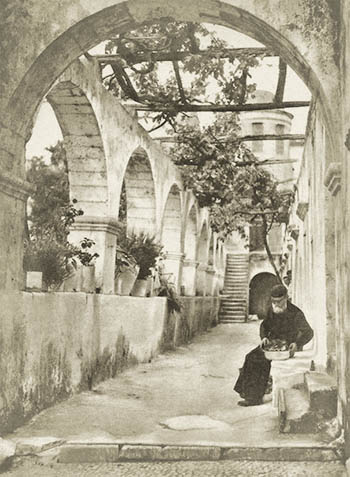 The city had many gardens and even vineyards. Many of the streets were arcaded.
The city had many gardens and even vineyards. Many of the streets were arcaded.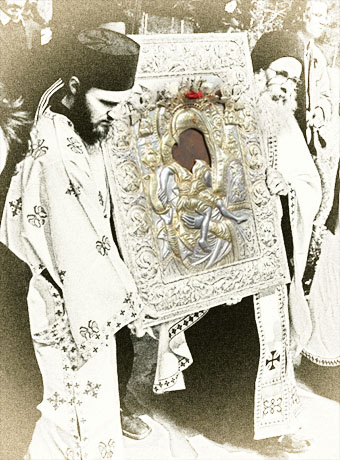
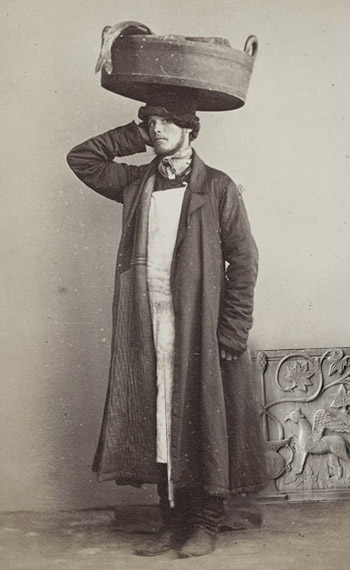 The streets were full of people who delivered fresh and prepared foods or every kind. Water was also delivered right to your door.
The streets were full of people who delivered fresh and prepared foods or every kind. Water was also delivered right to your door.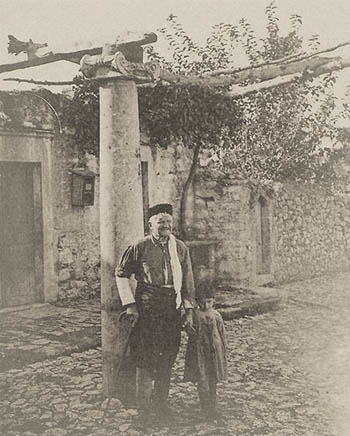 Constantinople was a late antique city of columns, forums and paved streets. Some streets and shops were lit at night.
Constantinople was a late antique city of columns, forums and paved streets. Some streets and shops were lit at night.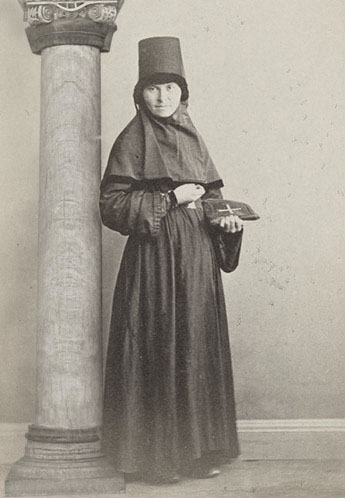 There were many priests, monks and nuns. Aristocrats and rich merchants founded and endowed convents for the female members of their family to retire to. Not all of them became nuns. Women could spend long periods of time living in nunneries as places of refuge.
There were many priests, monks and nuns. Aristocrats and rich merchants founded and endowed convents for the female members of their family to retire to. Not all of them became nuns. Women could spend long periods of time living in nunneries as places of refuge.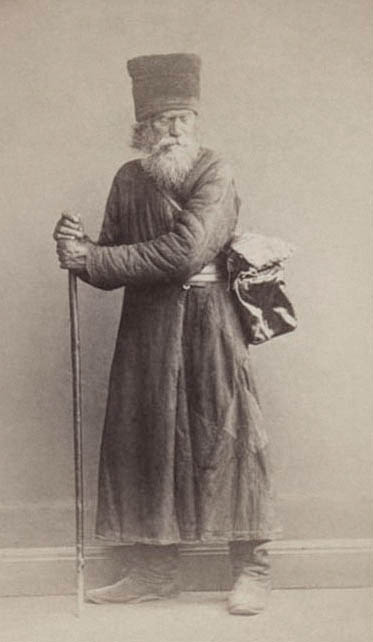 The city was the destination of pilgrims from all over the world. Every year, at Easter, the relics of Christ's Passion were exhibited in Hagia Sophia. Hundreds of thousands of people viewed them.
The city was the destination of pilgrims from all over the world. Every year, at Easter, the relics of Christ's Passion were exhibited in Hagia Sophia. Hundreds of thousands of people viewed them.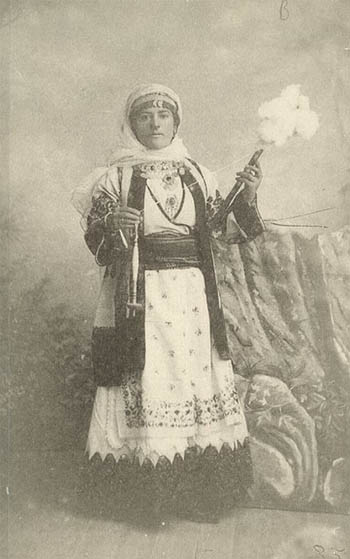 Women were very involved in the production of textiles and clothing. They also operated shops.
Women were very involved in the production of textiles and clothing. They also operated shops. Fashions changed rapidly in the 12th century. Men's fashions could be outlandish - even foppish. All men wore hats or turbans. Belts were decorated with buckles of bronze, silver and gold.
Fashions changed rapidly in the 12th century. Men's fashions could be outlandish - even foppish. All men wore hats or turbans. Belts were decorated with buckles of bronze, silver and gold. Imperial clothing was made in specialized shops near the Great Palace.
Imperial clothing was made in specialized shops near the Great Palace.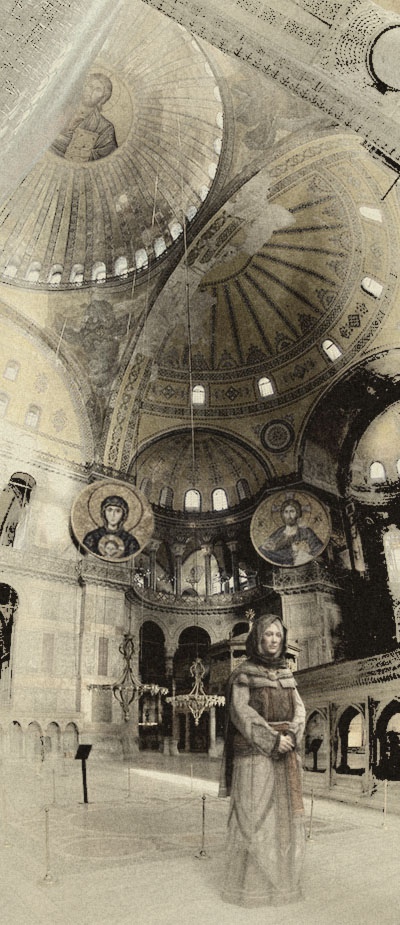 Women wore beautifully ornamented clothes. Much of this work was done at home. Byzantine women were expert seamstresses and tailors.
Women wore beautifully ornamented clothes. Much of this work was done at home. Byzantine women were expert seamstresses and tailors.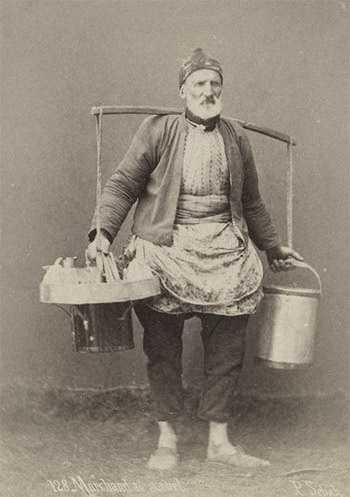 Hauling water and food was a hard job which was done by both men and women. Many of them could serve you wine, bread or fried delicacies in the streets. Some of them were attached to taverns.
Hauling water and food was a hard job which was done by both men and women. Many of them could serve you wine, bread or fried delicacies in the streets. Some of them were attached to taverns.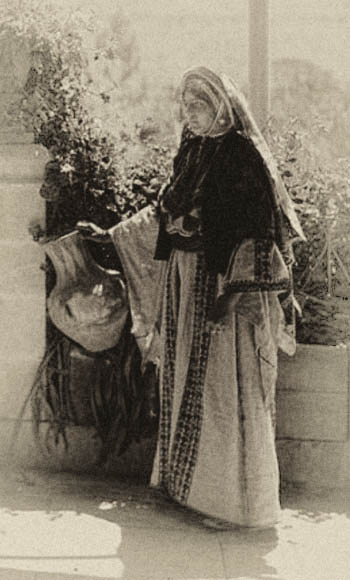 Most Constantinople homes had courtyards. Residents would get water here, do cooking or their washing here. Since people normally lived in family compounds or near their work these activities could be communal.
Most Constantinople homes had courtyards. Residents would get water here, do cooking or their washing here. Since people normally lived in family compounds or near their work these activities could be communal.



 Because the emperor Doukas found the imperial treasury neither full nor half-full, but completely emptied out, he reaped where he sowed not and gathered where he had not strawed, grievously afflicting those who were formerly girded with the highest offices under the Angelos family, who were elevated as sebastokrators and kaisars to exalted dignities, and their confiscated monies he applied to public needs.
Because the emperor Doukas found the imperial treasury neither full nor half-full, but completely emptied out, he reaped where he sowed not and gathered where he had not strawed, grievously afflicting those who were formerly girded with the highest offices under the Angelos family, who were elevated as sebastokrators and kaisars to exalted dignities, and their confiscated monies he applied to public needs. In rashly resisting the Latins, he surpassed all others; he shored up the City's sea walls with beams, provided the land walls with fortifications, and rekindled the army's courage with his own example. Moreover, clasping sword in. hand and armed with a bronze mace, he would beat back the enemy's sallies, and when they made sporadic sorties in search of provisions, he would appear suddenly before them of his own free will.
In rashly resisting the Latins, he surpassed all others; he shored up the City's sea walls with beams, provided the land walls with fortifications, and rekindled the army's courage with his own example. Moreover, clasping sword in. hand and armed with a bronze mace, he would beat back the enemy's sallies, and when they made sporadic sorties in search of provisions, he would appear suddenly before them of his own free will. A measure of the horrors was about to begin, others were already under way, and still others were to follow; the deliberations on amity were disregarded, wholly ignored. Certain wicked Telchines frequently confounded the negotiations. The doge of Venice, Enrico Dandolo, electing to discuss peace terms with the emperor, boarded a trireme and put in at Kosmidion. As soon as the emperor arrived there on horseback, they exchanged views on the peace, paying no heed to anyone else. The demands made by the doge and the remaining chiefs were for the immediate payment of five thousand pounds of gold and certain other conditions which were both galling and unacceptable to those who have tasted freedom and are accustomed to give, not take, commands. These demands were deemed to be heavy Laconian lashes to those for whom the danger of captivity was imminent and universal destruction had erupted, while the doge loudly again declared what had been stated earlier, that the conditions were quite tolerable and not at all burdensome. As the conditions for peace were being negotiated, Latin cavalry forces, suddenly appearing from above, gave free rein to their horses and charged the emperor, who wheeled his horse around, barely escaping the danger, while some of his companions were taken captive. Their inordinate hatred for us and our excessive disagreement with them allowed for no humane feeling between us.
A measure of the horrors was about to begin, others were already under way, and still others were to follow; the deliberations on amity were disregarded, wholly ignored. Certain wicked Telchines frequently confounded the negotiations. The doge of Venice, Enrico Dandolo, electing to discuss peace terms with the emperor, boarded a trireme and put in at Kosmidion. As soon as the emperor arrived there on horseback, they exchanged views on the peace, paying no heed to anyone else. The demands made by the doge and the remaining chiefs were for the immediate payment of five thousand pounds of gold and certain other conditions which were both galling and unacceptable to those who have tasted freedom and are accustomed to give, not take, commands. These demands were deemed to be heavy Laconian lashes to those for whom the danger of captivity was imminent and universal destruction had erupted, while the doge loudly again declared what had been stated earlier, that the conditions were quite tolerable and not at all burdensome. As the conditions for peace were being negotiated, Latin cavalry forces, suddenly appearing from above, gave free rein to their horses and charged the emperor, who wheeled his horse around, barely escaping the danger, while some of his companions were taken captive. Their inordinate hatred for us and our excessive disagreement with them allowed for no humane feeling between us. The enemy ceased all hostilities through the next day and the day after, which was the Lord's day [Sunday, 10-11 April 1204]; on the third day, the twelfth day of the month of April, Monday of the sixth week of the Great Lent, they again sailed towards the City and put in along the shore. By midday our forces prevailed, even though the fighting was more intense and furious than on the preceding Friday. Since it was necessary for the queen of cities to put on the slave's yoke, God allowed our jaws to be constrained with bit and curb1507 because all of us, both priest and people, had turned away from him like a stiff-necked and unbridled horse. Two men on one of the scaling ladders nearest the Petria Gate, which was raised with great difficulty opposite the emperor, trusting themselves to fortune, were the first from among their comrades to leap down onto the tower facing them. When they drove off in alarm the Roman auxiliaries on watch, they waved their hands from above as a sign of joy and courage to embolden their countrymen. While they were jumping onto the tower, a knight by the name of Peter entered through the gate situated there. He was deemed most capable of driving in rout all the battalions,"" for he was nearly nine fathoms tall and wore on his head a helmet fashioned in the shape of a towered city. The noblemen about the emperor and the rest of the troops were unable to gaze upon the front of the helm's" of a single knight so terrible in form and spectacular in size and took to their customary flight as the efficacious medi- cine of salvation. Thus, by uniting and fusing into one craven soul, the cowardly thousands, who had the advantage of a high hill, were chased by one man from the fortifications they were meant to defend. When they reached the Golden Gate of the Land walls, they pulled down the new-built wall there, ran forth, and dispersed, deservedly taking the road to perdition and utter destruction. The enemy, now that there was no one to raise a hand against them, ran everywhere and drew the sword against every age and sex. Each did not join with the next man to form a coherent battle array, but all poured out and scattered, since everyone was terrified of them.
The enemy ceased all hostilities through the next day and the day after, which was the Lord's day [Sunday, 10-11 April 1204]; on the third day, the twelfth day of the month of April, Monday of the sixth week of the Great Lent, they again sailed towards the City and put in along the shore. By midday our forces prevailed, even though the fighting was more intense and furious than on the preceding Friday. Since it was necessary for the queen of cities to put on the slave's yoke, God allowed our jaws to be constrained with bit and curb1507 because all of us, both priest and people, had turned away from him like a stiff-necked and unbridled horse. Two men on one of the scaling ladders nearest the Petria Gate, which was raised with great difficulty opposite the emperor, trusting themselves to fortune, were the first from among their comrades to leap down onto the tower facing them. When they drove off in alarm the Roman auxiliaries on watch, they waved their hands from above as a sign of joy and courage to embolden their countrymen. While they were jumping onto the tower, a knight by the name of Peter entered through the gate situated there. He was deemed most capable of driving in rout all the battalions,"" for he was nearly nine fathoms tall and wore on his head a helmet fashioned in the shape of a towered city. The noblemen about the emperor and the rest of the troops were unable to gaze upon the front of the helm's" of a single knight so terrible in form and spectacular in size and took to their customary flight as the efficacious medi- cine of salvation. Thus, by uniting and fusing into one craven soul, the cowardly thousands, who had the advantage of a high hill, were chased by one man from the fortifications they were meant to defend. When they reached the Golden Gate of the Land walls, they pulled down the new-built wall there, ran forth, and dispersed, deservedly taking the road to perdition and utter destruction. The enemy, now that there was no one to raise a hand against them, ran everywhere and drew the sword against every age and sex. Each did not join with the next man to form a coherent battle array, but all poured out and scattered, since everyone was terrified of them. To continue with the remaining portions of my narrative, the day waned and night came on, and each and every citizen busied himself with removing and burying his possessions. Some chose to leave the City, and whoever was able hastened to save himself. When Doukas saw that he could prevail nothing, he was fearful lest he be apprehended and put into the jaws of the Latins as their dinner or dessert, and he entered the Great Palace. He put on board a small fishing boat the Empress Euphrosyne, Emperor Alexios's wife, and her daughters, one of whom he loved passionately [Evdokia] (for he had frequently engaged in sexual intercourse from the first appearance of hair on his cheek, and he was a proven lecher in bed, having put away two wedded wives) and sailed away from the City [night of 12- 13 April 1204], having reigned two months and sixteen days.
To continue with the remaining portions of my narrative, the day waned and night came on, and each and every citizen busied himself with removing and burying his possessions. Some chose to leave the City, and whoever was able hastened to save himself. When Doukas saw that he could prevail nothing, he was fearful lest he be apprehended and put into the jaws of the Latins as their dinner or dessert, and he entered the Great Palace. He put on board a small fishing boat the Empress Euphrosyne, Emperor Alexios's wife, and her daughters, one of whom he loved passionately [Evdokia] (for he had frequently engaged in sexual intercourse from the first appearance of hair on his cheek, and he was a proven lecher in bed, having put away two wedded wives) and sailed away from the City [night of 12- 13 April 1204], having reigned two months and sixteen days. Receiving the supreme office by lot, Laskaris refused the imperial insignia; escorted by the patriarch to the Milion, he continuously exhorted the assembled populace, cajoling them to put up a resistance. He pressed those who lift from the shoulder and brandish the deadly iron ax, sending them off to the imminent struggle, reminding them that they should not fear destruction any less than the Romans should the Roman empire fall to another nation: no longer would they be paid the ample wages of mercenaries or receive the far-famed gifts of honor of the imperial guard, and their pay in the future would be counted at a hair's worth. Thus did Laskaris, but not a single person from the populace responded to his blandishments. The ax-bearers agreed to fight for wages, deceitfully and cunningly exploiting the height of the danger for monetary gain, and when the Latin battalions clad in full armor made their appearance, they took flight to save themselves [early morning of 13 April 1204].
Receiving the supreme office by lot, Laskaris refused the imperial insignia; escorted by the patriarch to the Milion, he continuously exhorted the assembled populace, cajoling them to put up a resistance. He pressed those who lift from the shoulder and brandish the deadly iron ax, sending them off to the imminent struggle, reminding them that they should not fear destruction any less than the Romans should the Roman empire fall to another nation: no longer would they be paid the ample wages of mercenaries or receive the far-famed gifts of honor of the imperial guard, and their pay in the future would be counted at a hair's worth. Thus did Laskaris, but not a single person from the populace responded to his blandishments. The ax-bearers agreed to fight for wages, deceitfully and cunningly exploiting the height of the danger for monetary gain, and when the Latin battalions clad in full armor made their appearance, they took flight to save themselves [early morning of 13 April 1204]. What then should I recount first and what last of those things dared at that time by these murderous men? 0, the shameful dashing to earth of the venerable icons and the flinging of the relics of the saints, who had suffered for Christ's sake, into defiled places! How horrible it was to see the Divine Body and Blood of Christ poured out and thrown to the ground! These forerunners of Antichrist, chief agents and harbingers of his anticipated ungodly deeds, seized as plunder the precious chalices and patens; some they smashed, taking possession of the ornaments embellishing them, and they set the remaining vessels on their tables to serve as bread dishes and wine goblets. Just as happened long ago, Christ was now disrobed and mocked, his garments were parted, and lots were cast for them by this race; and although his side was not pierced by the lance, yet once more streams of Divine Blood poured to the earth.
What then should I recount first and what last of those things dared at that time by these murderous men? 0, the shameful dashing to earth of the venerable icons and the flinging of the relics of the saints, who had suffered for Christ's sake, into defiled places! How horrible it was to see the Divine Body and Blood of Christ poured out and thrown to the ground! These forerunners of Antichrist, chief agents and harbingers of his anticipated ungodly deeds, seized as plunder the precious chalices and patens; some they smashed, taking possession of the ornaments embellishing them, and they set the remaining vessels on their tables to serve as bread dishes and wine goblets. Just as happened long ago, Christ was now disrobed and mocked, his garments were parted, and lots were cast for them by this race; and although his side was not pierced by the lance, yet once more streams of Divine Blood poured to the earth. It was not that these crimes were committed in this fashion while others were not, or that some acts were more heinous than others, but that the most wicked and impious deeds were perpetrated by all with one accord. Did these madmen, raging thus against the sacred, spare pious matrons and girls of marriageable age or those maidens who, having chosen a life of chastity, were consecrated to God? Above all, it was a difficult and arduous task to mollify the barbarians with entreaties and to dispose them kindly towards us, as they were highly irascible and bilious and unwilling to listen to anything. Everything incited their anger, and they were thought fools and became a laughingstock. He who spoke freely and openly was rebuked, and often the dagger would be drawn against him who expressed a small difference of opinion or who hesitated to carry out their wishes.
It was not that these crimes were committed in this fashion while others were not, or that some acts were more heinous than others, but that the most wicked and impious deeds were perpetrated by all with one accord. Did these madmen, raging thus against the sacred, spare pious matrons and girls of marriageable age or those maidens who, having chosen a life of chastity, were consecrated to God? Above all, it was a difficult and arduous task to mollify the barbarians with entreaties and to dispose them kindly towards us, as they were highly irascible and bilious and unwilling to listen to anything. Everything incited their anger, and they were thought fools and became a laughingstock. He who spoke freely and openly was rebuked, and often the dagger would be drawn against him who expressed a small difference of opinion or who hesitated to carry out their wishes. The whole head was in pain. There were lamentations and cries of woe and weeping in the narrow ways, wailing at the crossroads, moaning in the temples, outcries of men, screams of women, the taking of captives, and the dragging about, tearing in pieces, and raping of bodies heretofore sound and whole. They who were bashful of their sex were led about naked, they who were venerable in their old age uttered plaintive cries, and the wealthy were despoiled of their riches. Thus it was in the squares, thus it was on the corners, thus it was in the temples, thus it was in the hiding places; for there was no place that could escape detection or that could offer asylum to those who came streaming in.
The whole head was in pain. There were lamentations and cries of woe and weeping in the narrow ways, wailing at the crossroads, moaning in the temples, outcries of men, screams of women, the taking of captives, and the dragging about, tearing in pieces, and raping of bodies heretofore sound and whole. They who were bashful of their sex were led about naked, they who were venerable in their old age uttered plaintive cries, and the wealthy were despoiled of their riches. Thus it was in the squares, thus it was on the corners, thus it was in the temples, thus it was in the hiding places; for there was no place that could escape detection or that could offer asylum to those who came streaming in. Such then, to make a long story short, were the outrageous crimes committed by the Western armies against the inheritance of Christ. Without showing any feelings of humanity whatsoever, they exacted from all their money and chattel, dwellings and clothing, leaving to them nothing of all their goods. Thus behaved the brazen neck, the haughty spirit, the high brow, the ever-shaved and youthful cheek, the bloodthirsty right hand, the wrathful nostril, the disdainful eye, the insatiable jaw, the hateful heart, the piercing and running speech practically dancing over the lips. More to blame were the learned and wise among men, they who were faithful to their oaths, who loved the truth and hated evil, who were both more pious and just and scrupulous in keeping the commandments of Christ than we "Greeks.""" Even more culpable were those who had raised the cross to their shoulders, who had time and again sworn by it and the sayings of the Lord to cross over Christian lands without bloodletting, neither turning aside to the right nor inclining to the left, and to take up arms against the Saracens and to stain red their swords in their blood; they who had sacked Jerusalem, and had taken an oath not to marry or to have sexual intercourse with women as long as they carried the cross on their shoulders, and who were consecrated to God and commissioned to follow in his footsteps.
Such then, to make a long story short, were the outrageous crimes committed by the Western armies against the inheritance of Christ. Without showing any feelings of humanity whatsoever, they exacted from all their money and chattel, dwellings and clothing, leaving to them nothing of all their goods. Thus behaved the brazen neck, the haughty spirit, the high brow, the ever-shaved and youthful cheek, the bloodthirsty right hand, the wrathful nostril, the disdainful eye, the insatiable jaw, the hateful heart, the piercing and running speech practically dancing over the lips. More to blame were the learned and wise among men, they who were faithful to their oaths, who loved the truth and hated evil, who were both more pious and just and scrupulous in keeping the commandments of Christ than we "Greeks.""" Even more culpable were those who had raised the cross to their shoulders, who had time and again sworn by it and the sayings of the Lord to cross over Christian lands without bloodletting, neither turning aside to the right nor inclining to the left, and to take up arms against the Saracens and to stain red their swords in their blood; they who had sacked Jerusalem, and had taken an oath not to marry or to have sexual intercourse with women as long as they carried the cross on their shoulders, and who were consecrated to God and commissioned to follow in his footsteps.



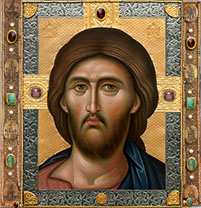 click here for icons of christ
click here for icons of christ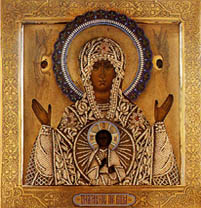 click here for icons of the theotokos
click here for icons of the theotokos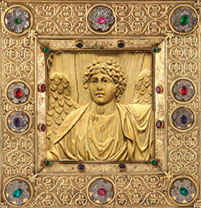 click here for icons of angels
click here for icons of angels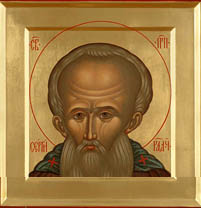 click here for icons of saints
click here for icons of saints








